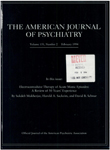A crossover study of focused cognitive therapy for panic disorder
Abstract
OBJECTIVE: This study sought to determine the short- and long-term effects of focused cognitive therapy for panic disorder. METHOD: Thirty- three psychiatric outpatients with the DSM-III diagnosis of panic disorder were randomly assigned to either 12 weeks of individual, focused cognitive therapy or 8 weeks of brief supportive psychotherapy based on principles of client-centered therapy. The patients who received supportive psychotherapy were subsequently given the opportunity to cross over to cognitive therapy for 12 weeks. Patients were rated for panic and depression before therapy, after 4 and 8 weeks of therapy, and at 6-month and 1-year follow-up. RESULTS: Clinician ratings and self-ratings of panic frequency and intensity indicated that the focused cognitive therapy group achieved significantly greater reductions in panic symptoms and general anxiety after 8 weeks of treatment than did the group that received brief supportive psychotherapy. At 8 weeks, 71% of the cognitive therapy group were panic free, compared to 25% of the psychotherapy group. Moreover, 94% of the psychotherapy patients elected to cross over to 12 weeks of cognitive therapy. At 1-year follow-up, 87% of the group that received cognitive therapy only and 79% of the group that crossed over into cognitive therapy remained free of panic attacks. CONCLUSIONS: Focused cognitive therapy offers a promising nonpharmacological alternative for the treatment of panic disorder.
Access content
To read the fulltext, please use one of the options below to sign in or purchase access.- Personal login
- Institutional Login
- Sign in via OpenAthens
- Register for access
-
Please login/register if you wish to pair your device and check access availability.
Not a subscriber?
PsychiatryOnline subscription options offer access to the DSM-5 library, books, journals, CME, and patient resources. This all-in-one virtual library provides psychiatrists and mental health professionals with key resources for diagnosis, treatment, research, and professional development.
Need more help? PsychiatryOnline Customer Service may be reached by emailing [email protected] or by calling 800-368-5777 (in the U.S.) or 703-907-7322 (outside the U.S.).



